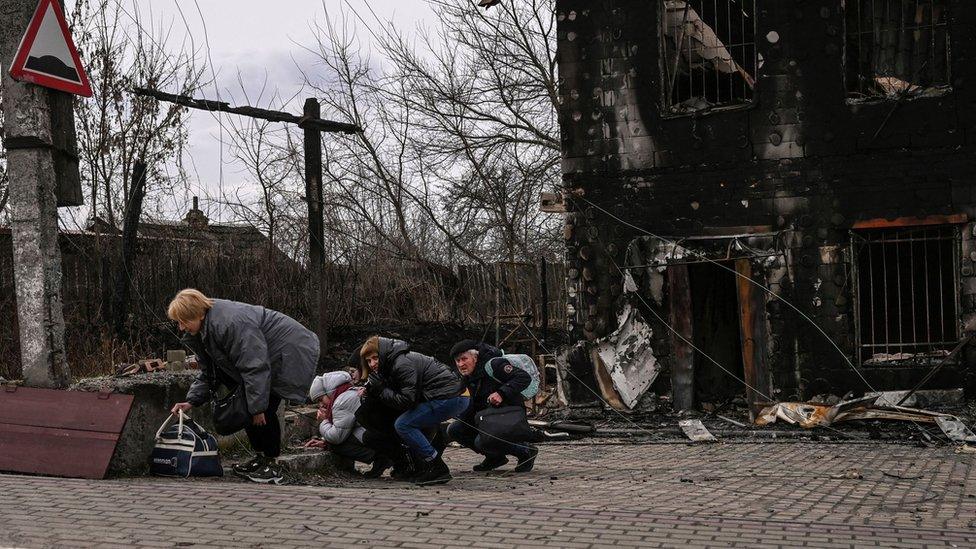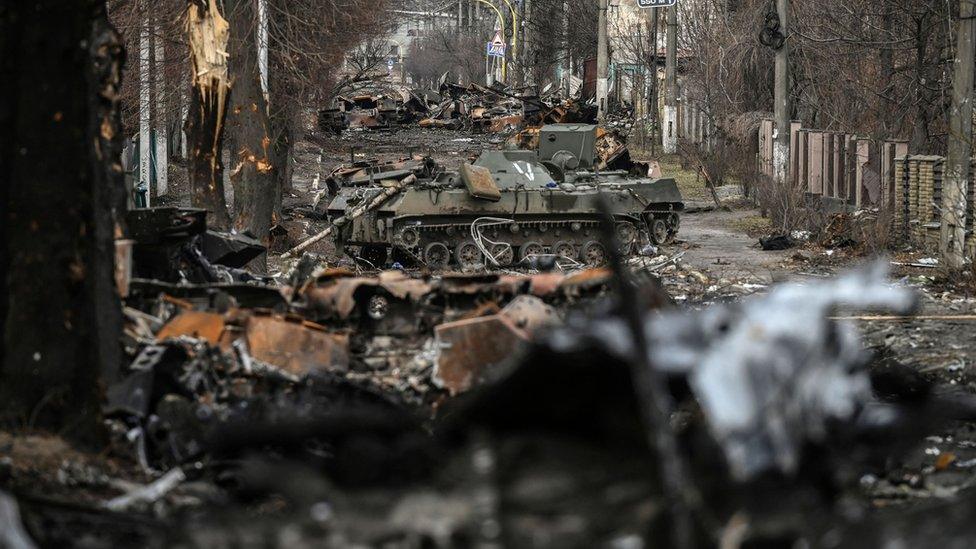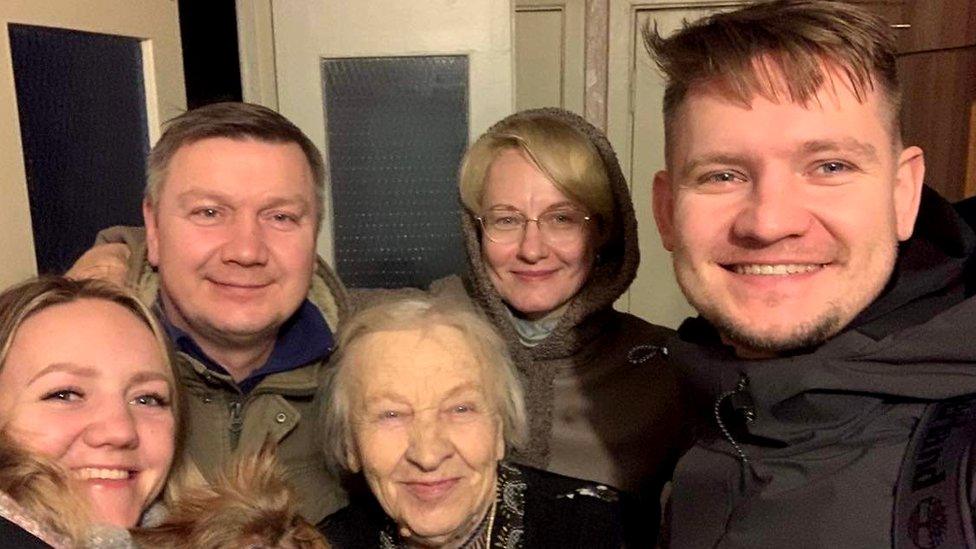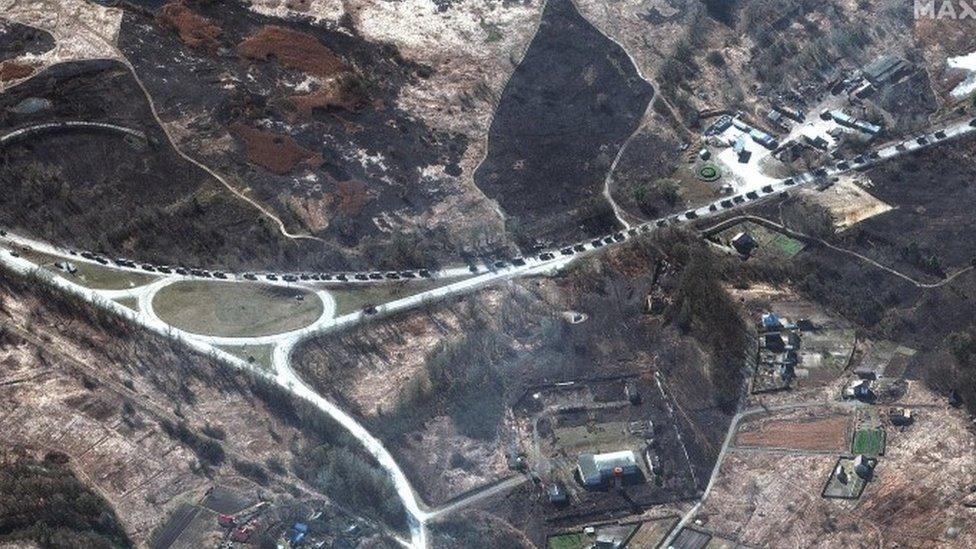Russia-Ukraine war: Family drags grandmother to safety from Bucha
- Published

Bucha is encircled and its residents face constant shelling
"The last straw was when a Russian tank shelled my neighbour's house and a nearby church," says Dmytro Tkachuk. He then decided it was time to flee Bucha, a small town just to the north-west of Kyiv. "The dome of the church is destroyed. It's terrifying."
Ukraine's emergency services have singled out Bucha and the area around it as facing one of the worst humanitarian situations in Ukraine. The biggest emergency is in Mariupol, a key port city of more than 400,000 people.
Bucha is encircled by the Russian army and partly occupied. It has come under relentless bombardment since the start of the war.

Bucha's streets are littered with destroyed Russian armoured vehicles
No humanitarian aid or food has reached the town for days. Thousands of residents remain trapped in basements, many of them elderly or with severe disabilities. Communications are down and there is little hope of getting in touch with friends and family.
Escaping Bucha meant a 17km (10.5-mile) trek for Dmytro, a 30-year-old lawyer, along with his sister, his mother and his two grandmothers, aged 74 and 83. They were joined by two neighbours and a small dog.
As shells exploded nearby, they had to fling themselves to the ground at least 20 times.
Not long after they had left, his grandmother could walk no more and he and his sister had to drag her for much of the way under fire.
"My granny begged us to leave her behind. She didn't want to be a burden for us but we didn't drop our loved ones."

A relieved Dmytro (R) poses here with (L-R) his sister, neighbour, grandmother and mother
There was no safe corridor for evacuation and no help for them. They knew the risk but carried on until they eventually reached safety near Kyiv in what the family believes is a miracle.
"On our way out of Bucha I saw bodies lying on the ground all over the place. I saw people going crazy in front of their burning houses. I saw entire apartment blocks torn out of the soil. It was appalling."
Bucha was one of the evacuation corridors agreed by the Ukrainian government and Russian defence ministry on Wednesday. But no ceasefire was confirmed and only people like Dmytro have made it out.
While thousands of Ukrainians have managed to escape bombarded towns and cities, Mariupol, Bucha, Izyum and other areas remain isolated. Bucha is only a few kilometres from the front of Russia's notorious 64km convoy of stalled armoured vehicles, tanks, and artillery.
WATCH: 3D model shows extent of Russian military convoy
For five days there has been no word from a colleague and her mother who are trapped together in Bucha. In her last message she said that there was no escape and their only means of survival was to try to sleep for as long as possible in the freezing cold of their unheated basement.
There is no electricity or heating. The gas has been cut off because of fires caused by shelling. No food supply is getting in and there is no mobile reception. Occasional internet access is the only way of getting messages through to the outside world.
Earlier this week one disabled resident managed to post an appeal on her Facebook page. She and other people with disabilities had become hostages, she said. They were unable to hide in shelters and had no access to food, water and medicines.
Our house was under direct shelling from a tank. The city is looted by Russian invaders. We have no chance to rescue - we have nowhere to run!

The next day she posted an update to say she was alive and had managed to cook a meal with her neighbours.
Dmytro fled when he decided he and his family had little chance to survive.
They had to avoid a Russian checkpoint to get out of the town and then once they had reached neighbouring Irpin they hid under the town's half-destroyed bridge.


From Irpin they crossed a field as fast as they could under constant mortar fire.
They were warned repeatedly of the deadly risk they were taking. Shrapnel flew past them and they saw houses and a bridge hit as they passed.
"My whole life was flashing by. I was praying to God to survive," says Dmytro.
The heaviest shelling came from the direction they were heading in as Ukrainian forces tried to halt the Russian advance.
"I realised that was our route to safety, despite the loudest explosions coming from over there."
They finally reached a bus heading for Kyiv. But for many others in their town the nightmare continues.

War in Ukraine: More coverage
OCCUPIED CITY: 'We are not co-operating'
RUSSIA MOTHERS: 'How do I get my soldier son back?'
EXPLAINED: Why Putin has invaded Ukraine?
IN DEPTH: Full coverage of the conflict

Related topics
- Published3 March 2022
